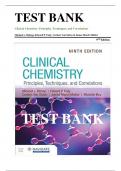TEST BANK
Clinical Chemistry: Principles, Techniques, and Correlations
Michael L. Bishop, Edward P. Fody, Carleen Van Siclen & James March Mistler
9TH Edition
TEST BANK
,Clinical Chemistry: Principles, Techniques, and Correlations, Ninth Edition
Test bank
Import Settings:
Base Settings: Brownstone Default
Information Field: Complexity
Information Field: Ahead
Information Field: Subject
Information Field: Title
Highest Answer Letter: D
Multiple Keywords in Same Paragraph: No
NAS ISBN13: 9781284238884, add to Ahead, Title tags
Chapter: Chapter 01 – Test Bank
Multiple Choice
1. One nanogram is equivalent to how many grams?
A) 10-6
B) 10-9
C) 10-12
D) 10-15
Ans: B
Complexity: RL2
Ahead: Units of Measure
Subject: Chapter 1
Title: Basic Principles and Practices of Clinical Chemistry
2. How many milliliters of 0.5N NaOH are required to make 100 milliliters of 0.2N NaOH?
A) 250
B) 40
C) 25
D) 4
Ans: B
Complexity: RL2
Ahead: Laboratory Mathematics and Calculations
Subject: Chapter 1
Title: Basic Principles and Practices of Clinical Chemistry
3. A patient sample for uric acid gave an absorbance reading of 0.4, and the 50 mg/dL standard gave an
absorbance reading of 0.1. What is the concentration of uric acid in the patient's sample in grams per
deciliter?
A) 0.2
B) 12.5
C) 125
D) 200
Ans: D
Complexity: RL2
Ahead: Laboratory Mathematics and Calculations
© Jones & Bartlett Learning, LLC, an Ascend Learning Company 1-1
,Clinical Chemistry: Principles, Techniques, and Correlations, Ninth Edition
Test bank
Subject: Chapter 1
Title: Basic Principles and Practices of Clinical Chemistry
4. How many millimoles of NaCl are contained in 300 mL of a 4M solution? (gmw = 58.5)
A) 70
B) 120
C) 234
D) 1200
Ans: D
Complexity: RL2
Ahead: Laboratory Mathematics and Calculations
Subject: Chapter 1
Title: Basic Principles and Practices of Clinical Chemistry
5. How is 10 mg/dL of calcium reported in mmol/L? (gmw = 40)
A) 2.5
B) 5.0
C) 10
D) 25
Ans: A
Complexity: RL2
Ahead: Laboratory Mathematics and Calculations
Subject: Chapter 1
Title: Basic Principles and Practices of Clinical Chemistry
6. How many milliliters of concentrated sulfuric acid (H2S04), G.M.W. = 98 grams, specific gravity = 1.500,
purity = 80%, are needed to make 400 mL of a 2N solution?
A) 26.1
B) 32.7
C) 52.3
D) 65.3
Ans: B
Complexity: RL2
Ahead: Laboratory Mathematics and Calculations
Subject: Chapter 1
Title: Basic Principles and Practices of Clinical Chemistry
7. How many grams of hydrated MgSO4 5 H20 (M.W.: MgSO4 = 119, H20 = 18) are required to make a
10% solution of MgS04?
A) 5.7 g/dL
B) 11.9 g/dL
C) 17.6 g/dL
D) 20.9 g/dL
Ans: C
Complexity: RL2
Ahead: Laboratory Mathematics and Calculations
Subject: Chapter 1
Title: Basic Principles and Practices of Clinical Chemistry
© Jones & Bartlett Learning, LLC, an Ascend Learning Company 1-2
, Clinical Chemistry: Principles, Techniques, and Correlations, Ninth Edition
Test bank
8. What is the molarity (M) of a 4% solution of sodium hydroxide (NaOH)? M.W: Na = 23, O = 16, H = 1.
A) 0.1M
B) 0.25M
C) 1.0M
D) 2.5M
Ans: C
Complexity: RL2
Ahead: Laboratory Mathematics and Calculations
Subject: Chapter 1
Title: Basic Principles and Practices of Clinical Chemistry
9. 3 mg/dL is equivalent to how many grams per liter?
A) 0.003
B) 0.03
C) 0.3
D) 3
Ans: B
Complexity: RL2
Ahead: Units of Measure
Subject: Chapter 1
Title: Basic Principles and Practices of Clinical Chemistry
10. What is the normality of a solution containing 4.5 grams of BaCl2 in 400 mL? (gmw = 208)
A) 1.10
B) 0.50
C) 0.25
D) 0.11
Ans: D
Complexity: RL2
Ahead: Laboratory Mathematics and Calculations
Subject: Chapter 1
Title: Basic Principles and Practices of Clinical Chemistry
11. What are the optimal conditions for specimen transport, handling, and storage of specimens for
clinical chemistry testing?
A) Specimen transported to lab within 2 hours after collection, stored at room temperature, and
centrifuged within 4 hours.
B) Specimen transported to lab immediately, permitted to clot, serum separated and tested as soon as
possible.
C) Specimen brought to lab immediately, spun down, and serum left to stand on clot until tested.
D) None of these represent optimal conditions.
Ans: B
Complexity: RL1
Ahead: Specimen Collection and Handling
Subject: Chapter 1
Title: Basic Principles and Practices of Clinical Chemistry
© Jones & Bartlett Learning, LLC, an Ascend Learning Company 1-3




